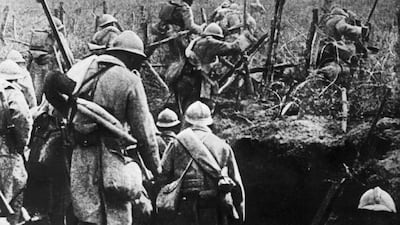When the First World War started 100 years ago, none of the participants envisaged that it would last more than four years and claim more than nine million lives. Looking back on the centenary of Germany's declaration of war on France, the optimism involved seems faintly absurd.
Amid the chaos and carnage seen around the world now, it is worth revisiting the factors that led to that conflict.
The single event that spurred the First World War is well known: the assassination of Archduke Franz Ferdinand of Austria by a Serbian nationalist in Sarajevo. It triggered a series of events that enveloped Russia, Germany, Belgium, France, Britain and beyond, ultimately involving 70 million military personnel.
But the war might not have started – and certainly would not have escalated to the extent it did – had there not been a growing sense of its inevitability in the years leading up to August 1914. Rhetoric coming from Germany and the Austro-Hungarian empire on one side and the alliance of Britain, France and the Russian empire on the other, demonstrated that there had long been an acceptance of war: there was a loaded gun just waiting for somebody to pull the trigger.
Rather than securing the swift victory over France that they expected, the Germans met with resistance in Belgium, leading to long, bloody trench warfare on the Western Front that created unprecedented human misery. But that was not the end of it. Just over 20 years after the armistice that ended the supposed “war to end all wars” – a phrase now used disparagingly rather than descriptively – Europe and much of the rest of the world was embroiled in another conflagration that cost 60 million lives and caused us to start numbering wars.
Time and again through the last century and this, the world has seen tensions that might have been solved through diplomacy explode into conflict. In many cases, talk of war became a self-fulfilling prophecy.
Most recently, in Gaza, hawks on both sides were looking for an excuse to break the uneasy ceasefire between Israel and Hamas before it came in the form of the kidnapping and murder of three Israeli teenagers by members of a rogue Hamas cell in the West Bank.
War is only inevitable when people on both sides will it. The still unlearnt lesson of 1914 is to find another way before giving in to the rhetoric that makes inevitable armed conflict and the death of millions.

